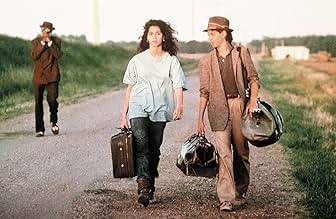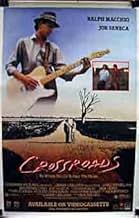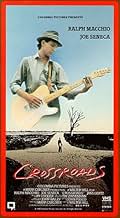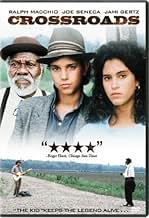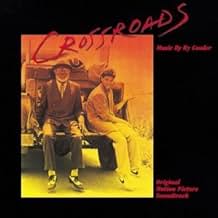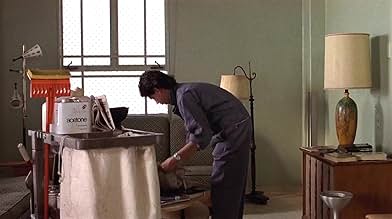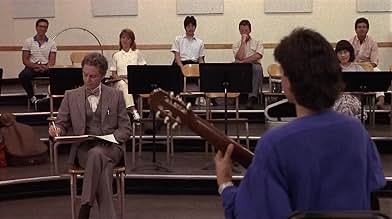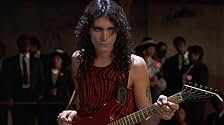A wannabe blues-guitar virtuoso finds an old blues player and hopes he can teach him a long-lost song by legendary musician, Robert Johnson.A wannabe blues-guitar virtuoso finds an old blues player and hopes he can teach him a long-lost song by legendary musician, Robert Johnson.A wannabe blues-guitar virtuoso finds an old blues player and hopes he can teach him a long-lost song by legendary musician, Robert Johnson.
- Awards
- 1 win total
Tom Donaldson
- John McGraw
- (as Tex Donaldson)
- Director
- Writer
- All cast & crew
- Production, box office & more at IMDbPro
Featured reviews
I have watched this movie no less than 20 times which is rare for me as I generally don't watch a movie more than 2 or 3 times and that's if I really, really, like it. Everyone in this movie did a fantastic job in my humble opinion.
* Minor Spoilers *
Eugene Martone, the 'Lightening Boy' (Ralph Macchio, an actor who presently 'disappeared' from the big screen) is a lover of blues. He studies guitar in Julliard, but he indeed is looking for the thirtieth unknown song of Roberto Johnson. One day, he meets Willie Brown, the 'Blind Dog Fulton' (Joe Seneca) in an old folk's home and is convinced that he possess the lost song. Eugene helps Willie to escape the asylum and goes with him to Mississippi. They can just afford a bus ticket from New York to half way to Mississippi, so the rest of their journey is hitchhiking. In the way, they meet Frances (Jami Gertz, also vanished from the screen), a girl who left home and wishes to be a dancer in Los Angeles. They three together will pass through many strange adventures and situations. The climax of the movie is the guitar duel between Eugene and Jack Butler (Steve Vai).
This movie is the most wonderful tribute to blues ever made. The cast, direction and soundtrack are perfect. Thank you Walter Hill and John Fusco for such a delightful film. The astonishing music of Ry Cooder is spectacular. If the viewer loves blues like me, will certainly not get tired of watching this movie and listen to the CD with the marvelous soundtrack. In Brazil, this movie has not been released on DVD (only in VHS and the soundtrack on CD). This movie is completely underrated in IMDb. I do not agree with the 6.1 user rating in IMDb. My vote is ten.
Title (Brazil): "Encruzilhada" ("Crossroads")
Note: On 08 January 2012, I saw this wonderful film again on an imported DVD.
Eugene Martone, the 'Lightening Boy' (Ralph Macchio, an actor who presently 'disappeared' from the big screen) is a lover of blues. He studies guitar in Julliard, but he indeed is looking for the thirtieth unknown song of Roberto Johnson. One day, he meets Willie Brown, the 'Blind Dog Fulton' (Joe Seneca) in an old folk's home and is convinced that he possess the lost song. Eugene helps Willie to escape the asylum and goes with him to Mississippi. They can just afford a bus ticket from New York to half way to Mississippi, so the rest of their journey is hitchhiking. In the way, they meet Frances (Jami Gertz, also vanished from the screen), a girl who left home and wishes to be a dancer in Los Angeles. They three together will pass through many strange adventures and situations. The climax of the movie is the guitar duel between Eugene and Jack Butler (Steve Vai).
This movie is the most wonderful tribute to blues ever made. The cast, direction and soundtrack are perfect. Thank you Walter Hill and John Fusco for such a delightful film. The astonishing music of Ry Cooder is spectacular. If the viewer loves blues like me, will certainly not get tired of watching this movie and listen to the CD with the marvelous soundtrack. In Brazil, this movie has not been released on DVD (only in VHS and the soundtrack on CD). This movie is completely underrated in IMDb. I do not agree with the 6.1 user rating in IMDb. My vote is ten.
Title (Brazil): "Encruzilhada" ("Crossroads")
Note: On 08 January 2012, I saw this wonderful film again on an imported DVD.
This movie starts slow and begins moving quickly as we see an outstanding modern version of faust (more like the Devil went down to Georgia). The end is a spectacular show down between Ralph Machio on a classic guitar vs. A rock & roll demon.
This is a really, really good movie and I don't understand why no one ever mentions it or why it is never on cable.
It has everything that I love in a movie: good story, great characters well acted, fine comedy and powerful touching drama. Ralph Macchio is a brilliant young guitar student, Eugene Martone, at Julliard (or some other equally good music school) who does not want to play Mozart. He wants to play guitar like his idol, a long dead blues guitar legend. In search of his dreams, he breaks an elderly black blues player out of a prison nursing home.
The two of them go on an odyssey to the Mississippi Delta in quest of memories and dreams. As in any odyssey, they meet a variety of fascinating and/or dangerous characters along the way. Eugene must also overcome the obstacles and tests that all those who quest must face - until it is time to face the ultimate test against the greatest blues guitarist in the Delta.
I enjoy music, but my knowledge is superficial. I probably wouldn't know a good guitar riff from a raft, but even I could recognize awesome guitar work in the final sequence of Crossroads.
So, if you like good movies and good acting and great guitar music, please check out Crossroads. If enough of us spread the word, it may no longer be a forgotten classic.
It has everything that I love in a movie: good story, great characters well acted, fine comedy and powerful touching drama. Ralph Macchio is a brilliant young guitar student, Eugene Martone, at Julliard (or some other equally good music school) who does not want to play Mozart. He wants to play guitar like his idol, a long dead blues guitar legend. In search of his dreams, he breaks an elderly black blues player out of a prison nursing home.
The two of them go on an odyssey to the Mississippi Delta in quest of memories and dreams. As in any odyssey, they meet a variety of fascinating and/or dangerous characters along the way. Eugene must also overcome the obstacles and tests that all those who quest must face - until it is time to face the ultimate test against the greatest blues guitarist in the Delta.
I enjoy music, but my knowledge is superficial. I probably wouldn't know a good guitar riff from a raft, but even I could recognize awesome guitar work in the final sequence of Crossroads.
So, if you like good movies and good acting and great guitar music, please check out Crossroads. If enough of us spread the word, it may no longer be a forgotten classic.
10alecwest
I've seen CROSSROADS so many times I've lost count. And, it won't be the last time I'll watch it. The music alone would be reason enough. But, this film is far deeper. And no amount of exposition about it could ever *SPOIL* it for the virgin-viewer who has never seen it.
Eugene Martone, considered a prodigy on the classical guitar, is a young Long Island man attending the prestigious Julliard Music School. Problem? He prefers the blues over classical. And he's on a quest. He uncovers evidence that blues guitar legend, Robert Johnson, composed 30 songs. Since only 29 were ever recorded, he becomes obsessed at finding the 'lost' song number 30 (and being the first person to record it). And, after some sleuthing, he finds an old photograph and a news clipping -- pointing him toward the only living person who would know that song and who, fortunately, lives nearby. His name is Willie Brown (aka Blind Dog Fulton, aka Smokehouse Brown), a friend of Robert Johnson who traveled and performed with him (harmonica/vocals). Brown lives in a penal facility for old people (a criminal's nursing home). At first, Brown denies his true identity. But confronted with a photo of himself next to Robert Johnson, Brown finally admits the truth. And, he agrees to teach Martone the lost song -- but ONLY if Martone breaks him out of the facility and takes him back to Mississippi.
The catch? Martone knows that lore surrounding Robert Johnson says he sold his soul to the Devil. What he doesn't know is that it's fact, not lore ... and that Willie Brown did the same thing. And Martone doesn't know that Brown's reason for going back to Mississippi is to return to the 'crossroads' where he and Johnson sold their souls in hopes of getting the Devil to release him from his contract. This culminates in an eerie finale where Martone gambles his soul in a blues duel with the Devil's own guitarist, Jack Butler ... to save Brown from eternal damnation.
Director Walter Hill is masterful, combining music, drama, alternate history, fantasy, and horror into a single plot. Kudos must also be given to screenwriter John Fusco for giving Hill a masterful script to work from. But contrary to most people, my favorite scene isn't the blues duel. It's the scene where Martone wakes up to find out a girl he met in his travels with Brown (and had a romantic interest in) has unexpectedly left them to go her own way. And immediately after that, Brown admits he lied... that there never was a song number 30. At that moment, Martone, who'd been merely a good blues 'player' up to that point picks up his guitar and begins to play a sad blues song ... one certainly coming from his soul, not from his memory of what others have played. It is that momentary 'graduation' scene (the transition between blues 'player' and blues 'man') that sets the stage for the duel ... with film watchers knowing Martone is as ready for it as he can be.
Eugene Martone, considered a prodigy on the classical guitar, is a young Long Island man attending the prestigious Julliard Music School. Problem? He prefers the blues over classical. And he's on a quest. He uncovers evidence that blues guitar legend, Robert Johnson, composed 30 songs. Since only 29 were ever recorded, he becomes obsessed at finding the 'lost' song number 30 (and being the first person to record it). And, after some sleuthing, he finds an old photograph and a news clipping -- pointing him toward the only living person who would know that song and who, fortunately, lives nearby. His name is Willie Brown (aka Blind Dog Fulton, aka Smokehouse Brown), a friend of Robert Johnson who traveled and performed with him (harmonica/vocals). Brown lives in a penal facility for old people (a criminal's nursing home). At first, Brown denies his true identity. But confronted with a photo of himself next to Robert Johnson, Brown finally admits the truth. And, he agrees to teach Martone the lost song -- but ONLY if Martone breaks him out of the facility and takes him back to Mississippi.
The catch? Martone knows that lore surrounding Robert Johnson says he sold his soul to the Devil. What he doesn't know is that it's fact, not lore ... and that Willie Brown did the same thing. And Martone doesn't know that Brown's reason for going back to Mississippi is to return to the 'crossroads' where he and Johnson sold their souls in hopes of getting the Devil to release him from his contract. This culminates in an eerie finale where Martone gambles his soul in a blues duel with the Devil's own guitarist, Jack Butler ... to save Brown from eternal damnation.
Director Walter Hill is masterful, combining music, drama, alternate history, fantasy, and horror into a single plot. Kudos must also be given to screenwriter John Fusco for giving Hill a masterful script to work from. But contrary to most people, my favorite scene isn't the blues duel. It's the scene where Martone wakes up to find out a girl he met in his travels with Brown (and had a romantic interest in) has unexpectedly left them to go her own way. And immediately after that, Brown admits he lied... that there never was a song number 30. At that moment, Martone, who'd been merely a good blues 'player' up to that point picks up his guitar and begins to play a sad blues song ... one certainly coming from his soul, not from his memory of what others have played. It is that momentary 'graduation' scene (the transition between blues 'player' and blues 'man') that sets the stage for the duel ... with film watchers knowing Martone is as ready for it as he can be.
Did you know
- Trivia"Eugene's Trick Bag", the updated classical piece at the film's climax, is largely based on Niccolò Paganini's "Caprice #5". According to myth, Paganini sold his soul to the devil for his musical skills. Steve Vai replicates Paganini's legendary rolling eyes, long unkempt hair and gaunt look.
- GoofsAt the time the movie was filmed, Julliard did not offer classes in classical guitar.
- Quotes
Willie Brown: The blues ain't nothin' but a good man feelin' bad, thinkin' 'bout the woman he once was with.
- ConnectionsFeatured in At the Movies: Salvador/Smooth Talk/Crossroads/Turtle Diary (1986)
Details
- Release date
- Country of origin
- Official site
- Language
- Also known as
- Le chemin de la gloire
- Filming locations
- Production company
- See more company credits at IMDbPro
Box office
- Gross US & Canada
- $5,839,031
- Opening weekend US & Canada
- $2,071,680
- Mar 16, 1986
- Gross worldwide
- $5,839,031
- Runtime
- 1h 39m(99 min)
- Color
- Sound mix
- Aspect ratio
- 1.85 : 1
Contribute to this page
Suggest an edit or add missing content




